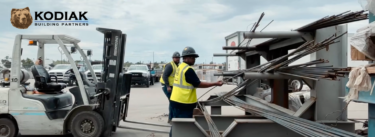In 2010 – a decade after going out into the work world and gaining some experience in for-profit work – I returned to my home town of Portland, Oregon wanting to make a difference using lean thinking. I didn’t know anybody doing Lean, so I aimed to start a community of lean-minded people with the intention of doing the following:
- Quarterly “gemba” visits to a member’s organization
- Collaboration with and for non-profit Lean work
- Information sharing at local relevant events
- Offline mentoring and collaboration
Lean Portland was born. Frankly, it was a lot of me reaching out in the beginning, but once it got rolling, it took on a life of its own. We began in 2011 with a trip of 15 people or so touring local businesses that had made advancements in their lean thinking. These included Nike’s in house manufacturing facility, Toyota’s North American distribution facility, and the new wing of a local children’s hospital. They were very interesting and a great opportunity to meet people with similar interests in our home town.
In 2012, we copied the local chapter of the Organizational Development Network and started a community consulting project through LinkedIn. I found three committed individuals with a diverse set of skills, having no idea how important their diverse skills would be. One person, for example, joined because her client was a lean consultant and she wanted to know more about his business. (She was a marketing professional and eventually took the lead in publicizing our interest in the nonprofit sector).
Thanks to her work, we fairly quickly heard from nonprofit organizations that were interested in collaborating. My team and I structured a set of interview questions that we thought would help us choose the right nonprofit organization to work with – an organization with a clear organizational need we thought we could help with. In truth, all of the nonprofits who reached out to us could use our help, but we also knew we needed to work with a company that had worked with coaches before and that was large enough to dedicate at least as many people to the effort as we did.
We held interviews, analyzed the results, and chose to work with the nonprofit, Friends of the Children – an organization with a mission to provide long-term mentoring relationships with at-risk youth.
A Collaboration Forms
Friends of the Children’s headquarters are in an old elementary school in North Portland near where their community members and target demographic lives. At the beginning of the project, we met with the organization’s three directors and two managers and others as needed. Each staff member is called a friend and almost everyone plays multiple roles.
We started with bi-weekly 90 minutes sessions just to get acquainted, and the learning went both ways. We saw that the client had no shared visual representation of their value streams or other work happening in their organization. The directors realized that they had just too many priorities. This insight alone allowed them to focus on a few breakthrough strategies and take action.
Over time, as we focused on teaching value stream mapping, we all realized we needed more input from more staff to make well-informed decisions about what kinds of improvements were needed. Luckily we connected with a local facilitator, Susan Eliot, who is an expert in leading focus groups. She held four such discussions to get input from staff and then taught us how to systematically analyze the qualitative data in order to reduce the large amount of narrative data that resulted, down to its essence. Next, we used a project management tool, The Prioritization matrix, to select a few individual projects to put into action. This was exciting at this point in the engagement for everyone because this was when we started scheduling activities to close the gap.
The two projects the client team decided to work on were:
- Improve the effectiveness of meetings.
- Reduce the amount of windshield time the Friends have commuting back and forth to where children live. This problem has been getting worse because of the eastward migration of poverty and low income housing where at-risk youth live.
Looking just at problem 2:
When a Friend is driving they are adding limited value to their mentee. The solutions the team eventually identified to solve this problem weren’t particularly innovative, but the directors were able to take action on this issue simply due to a renewed level of interest and much higher engagement on the issue from staff. They were able to use the A3 framework to get organized around a very clear goal.
Together, we helped the client team revisit their old ideas for dealing with this issue, put together a communication plan, a deployment schedule, and started to make improvements. Mary, the Accounting Manager, agreed to track miles reimbursed so that the team could see and know how they were making a difference. It was a lot of fun to see everyone’s confidence grow as they communicated improvements being made in real numbers. Soon we heard reports about how the executive director took her own A3 to the board, presenting it as a way of sharing their progress, goals, and new activities.
Since 2013 when this major activity drew to a close, Friends of the Children has implemented an internal sharing site through SharePoint and made plans toward opening a facility in East County (to open in fall 2015) that will help them serve youth closer to where they live. The directors of Friends of the Children still use A3s to manage projects and are teaching it to other team members. They continue to look for ways to improve their processes and service to youth. Along the way they continue to make incremental improvements and use approaches they learned in partnership with our lean practitioner-volunteers.
Reflections on What’s Next for Lean Portland
As for Lean Portland, we’re now a loose collection of about 250 people. We’re organizing a set of lean management classes for local nonprofit administrators, and there continues to be interest in pro-bono coaching. We’re using our coaching experiences to provide examples of the benefits of lean learning projects to other non-profits interested in Lean. To pull this off we’re partnering with Portland State University, The Non Profit Association of Oregon, the Portland Center for Nonprofit Resource Group, and The Young Nonprofit Professional Network.
Where can we improve? Keeping momentum going continues to be a challenge even in the face of interested and genuinely committed people. But the work continues. If you want to get started with this work I urge you find committed people who aren’t overly committed, limit the scope of what you want to accomplish, and setup lots of social hours and gemba tours to keep people interested and the learning fun.
Thanks to the Lean Portland volunteers: Janice Levenhagen-Seeley (Executive Director, ChickTech); Richard Coley (Principle, CFS Consulting); and Bret Matthews (Plant Manager, Advanced Color Systems). And thanks especially to Steve Bell and Karen Whitley Bell from Lean4NGO who have been a constant inspiration. Thanks as well to all of the Friends at Friends of the Children, especially Joe, Mary, Denise, Gary, and Rachel for being such great collaborators.





